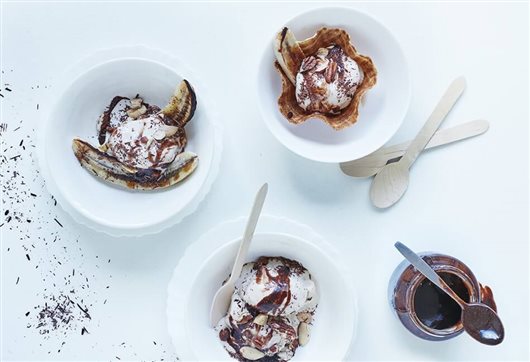With the high temperatures of late, I'm sure many of us have been looking longingly at the freezer cabinets in the shops, wondering if a cool and creamy ice cream could help us beat the heat. These last few weeks have been particularly hard for many of my patients going through cancer treatments, as drug regimens can make coping with humidity and high temperatures particularly difficult. I'm happy to recommend a bowl of soothing, tongue-tingling ice cream or a chilled dessert to anyone struggling in the heat, especially as the combination of protein, carbohydrates and fats can tempt the appetite when the energy-sapping heat and treatment makes it impossible to contemplate eating a full meal. Mention the words 'ice cream' to some, however, and fears over dairy rear their confusing head. You may also find that your treatment has made you more sensitive to dairy foods, or lactose intolerant, in which case you may want to look for alternatives to your usual milk, butter, cheese and cream.
The good news is that not all frozen treats contain milk and cream! A scoop or two of dairy-free sorbet could give you the big freeze you need, and I'll be sharing some recipes for both ice creams and sorbets in the weeks ahead. There are also many delicious alternatives to dairy found easily on the supermarket shelves, from nut milks and yoghurts to calcium-rich vegetables and fish. But first, let's look at what the science tells us about the links between dairy and cancer.
Some early research suggested that there could be a link between dairy intake and the risk of developing prostate and breast cancers, possibly because of the saturated fats they contain, or contaminants that could be present. This probably fuelled the common misconception that milk is 'full of hormones', although growth hormones are banned from use in the EU, and naturally occurring hormones in milk are present only at minute levels compared to what we produce in our own bodies. In contrast, a beneficial role for high calcium foods, such as dairy, has been suggested by other studies. The World Cancer Research Fund (WCRF), which reviews scientific evidence on diet and cancer, has concluded that diets high in calcium decrease the risk of cancer of the bowel. The WCRF has also concluded that the science linking dairy foods and other cancer is inconclusive, in terms of either negative or positive effects. This means that the consensus among the cancer-research community hasn't changed: that is, there's no clear evidence to support advice to eliminate dairy from the diet, either for cancer prevention or for cancer survivors.
Milk and dairy are good sources of calcium and protein, as well as iodine, which are needed as part of a healthy diet. But I firmly believe in personal choice and if you feel happier avoiding dairy, then this is something you can do and still be well nourished. I particularly like the flavour of almond milk, but you could also choose hemp, coconut, rice and oat milks, as well as yoghurts, butters and creams made from coconut and other nondairy ingredients. But do opt for fortified versions which have added essential vitamins and minerals. Fortified soya products are another option, although I realise some people are concerned about the phytoestrogens (naturally occuring oestrogen-like substances) found in soya, especially in relation to hormone-dependent cancers. While studies on animals have shown that large amounts of phytoestrogens affect the development of reproductive organs and fertility, there is no clear evidence that there is a similar effect in people.
Non-dairy milk alternatives may not have the same nutritional profile as dairy milks, and if you're eating dairy-free you will need to make a conscious effort to include other calcium-rich foods in your diet. Do take a look at the information on my website for information on the vegetables, fruits, seeds and even fish that are all good sources of calcium.
So what about those recipes I mentioned at the start? Dusting down our trusted ice cream maker and whipping up some homemade treats has become a ritual for me and my daughter Maya, marking the start of the school summer holidays. This year I'm hoping the glut of raspberries will mean plenty of raspberry frozen yoghurt will be devoured. Here's another idea for you to enjoy this summer.
Instant banana ice cream
This is the quickest and simplest ice cream ever. Both bananas and yoghurt are good sources of the mineral potassium, which can help us maintain a healthy blood pressure.
Preparation time: about 5 minutes
Serves: 2
Ingredients
2 frozen bananas (allow one banana per person)
400ml natural yoghurt or soya yoghurt
Method
Tip
Bananas freeze wonderfully well. Simply peel them, then pop them in a freezer bag and into the freezer. You need to allow them to thaw for five minutes before using, but once they're ready you can add them to smoothies, turn them into ice cream or bake with them - whatever your favourite banana recipe demands.
Join our Online Community to talk to other people affected by cancer
Read more on our Community News Blog
Keep up-to-date with the blog, Nourish - eating well with cancer
Whatever cancer throws your way, we’re right there with you.
We’re here to provide physical, financial and emotional support.
© Macmillan Cancer Support 2025 © Macmillan Cancer Support, registered charity in England and Wales (261017), Scotland (SC039907) and the Isle of Man (604). Also operating in Northern Ireland. A company limited by guarantee, registered in England and Wales company number 2400969. Isle of Man company number 4694F. Registered office: 3rd Floor, Bronze Building, The Forge, 105 Sumner Street, London, SE1 9HZ. VAT no: 668265007